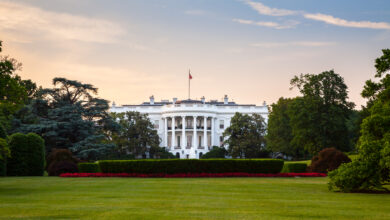It’s All About the Benjamins
This Essay Appeared in FP Interrupted on Friday, October 19, 2018

The only things missing were the back and knee slaps. Otherwise, it was all smiles and genteel banter on Tuesday when U.S. Secretary of State Mike Pompeo met with Saudi Arabia’s Prince Muhammad bin Salman (aka MBS). You’d think the visit was a courtesy catch-up among longtime allies. It wasn’t. Pompeo flew to Riyadh, Saudi Arabia’s capital, in what should have been a dressing down over Jamal Khashoggi.
Given the evidence, it seems certain that Saudi journalist Jamal Khashoggi is dead – tortured, beheaded, and dismembered at the hands of his country’s officials at the Saudi consulate in Istanbul, Turkey. Yet, instead of holding the Saudis accountable, Pompeo praised them for their willingness to investigate the matter, as if that would somehow render a less gruesome reality, or perhaps even miraculously produce an alive and kicking Khashoggi as well.
Pompeo has taken his cue from his boss, Donald Trump, who gives the Saudis the benefit of doubt. This week, Trump lashed out at reporters, analysts, and intelligence officers who have concluded that Khashoggi did indeed meet a grisly end. “Here we go again with you know, you’re guilty until proven innocent.” (FYI: innocence asked that you get off its lawn.)
Congress is having none of it. Republican chairman of the Senate Foreign Relations Committee, Bob Corker has said that the “intel points directly” to Saudi Arabia and “It would appear that he is not alive.” “I’m a single, white male and I’m not going to shut up” Lindsey Graham has pointed directly at bin Salman noting that “He (MBS) had this guy murdered… This MBS figure to me is toxic…He can never be a world leader on the world stage…This guy (MBS) has got to go.”
Will MBS go? Setting aside whatever explanation they give to the world, the Saudis have a lot of thinking to do, specifically about whether to keep MBS in power. Sure, the crown prince has promised to stamp out corruption in government and rollout reforms. Yes, that includes women driving. (Not sure why that’s a “reform” and not a given right, much less a no-brainer, but let us not digress.) At the same time, he has shown ruthless callousness. He has jailed members of the royal family, detained and abused Lebanese Prime Minister Saad Hariri, and has upped the brutality in Yemen, where Saudi Arabia is waging a proxy war with Iran. Close to 20,000 civilians have been killed, either at the hands of American weapons, famine, or cholera.
Meh, says the Trump administration. So, he’s aggressive. The best dictators are. (It might explain why Trump’s first foreign visit was to Riyadh.) That shouldn’t be a reason to turn our back on Saudi Arabia, (aka KSA) especially as it plans to hand over $110 billion for military arms (which was negotiated during the Obama administration). Bingo.
U.S.-Saudi relations are based on nothing but money, never principle. Throughout the 20th century, oil— which the Saudis led in producing (2nd largest reserves after Venezuela) and the Americans desperately needed — anchored the two countries together. Today, it’s guns and other weapons that bind us to KSA. The U.S. is the world’s largest exporter of weapons. (America First!) Saudi Arabia is our largest customer. It’s a friend with a whole lotta green benefits. Given who sits in the White House, do you honestly think they would do anything to jeopardize that? 🤔
One thing is for sure, Khashoggi’s killing has complicated Trump’s next move on Iran. On November 5, a day before the midterm elections, Trump is expected to impose sanctions on Iranian oil and gas. For it to be effective, the U.S. needs oil prices not to rise. That’s where Saudi Arabia is key. The kingdom is likely to benefit from sanctions on Iranian oil and gas. But if there is a threat of sanctions on it, it might raise prices. It’s all about the Benjamins.
Here’s a closer look at the matter:
- This isn’t the first time that Trump has seemed to reflect a foreign government’s talking points, Nahal Toosi and Andrew Restuccia write. (Politico)
- Khashoggi’s murder is Trump’s first tough foreign policy test – and he’s failing says Indira Lakshmanan. (Boston Globe)
- Today’s authoritarians have little regard for national borders when it comes to silencing their detractors. But will they pay for it? And is it worth the cost, Nina L. Khrushcheva asks. (Project Syndicate)
- Jamal Khashoggi’s disappearance has exposed Trump’s incoherent Middle East policy, argues Jennifer Rubin. (Washington Post)
- Khashoggi prompts Trump to reconsider human rights in foreign policy, says Elise Carlson-Rainer. (The Hill)
- The Khashoggi Case is a trigger for Arabs living in fear, says Tuqa Nusairat. (Atlantic Council)
- Roula Khalaf on the enduring myth of the young Arab reformer. Youth isn’t a commitment to change. (Financial Times)
This essay was reprinted with permission by FP Interrupted. To read the rest of this newsletter or to have it delivered it to your inbox each Friday, please click here. We will be publishing FP Interrupted each Friday.




